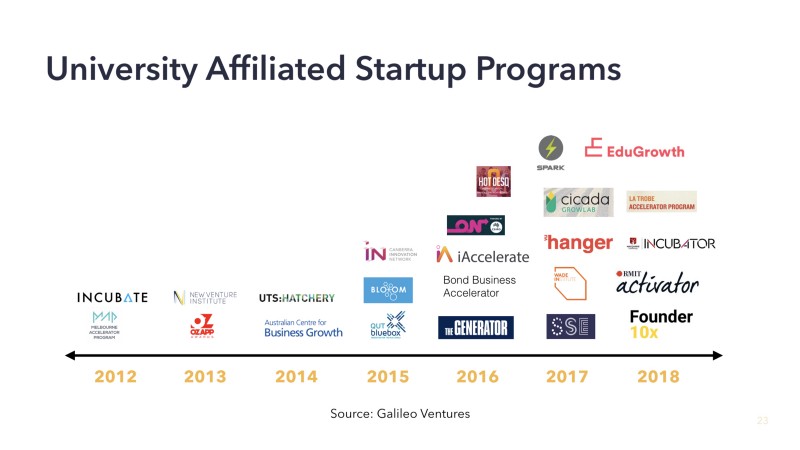“There’s just too many people signing up, I’m worried I wont be able to take on more customers” professed the young startup founder at a recent mentor meeting. “You see, this is a good problem to have!” the mentor proclaimed.
In less than 10 years Australia’s technology startup sector has gone from very little activity to an explosion of people and investment –– the ecosystem Down Under is now one of the fastest growing startup sectors globally.
If you don’t live in Australia it’s hard to describe how different it is today compared with even 5 years ago (and how quick we are take it for granted).
5 years ago in Australia:
- VC funds raised $155m –– and there were only 3 active funds (one of the lowest in OECD countries)¹
- You could count the amount of accelerators on one hand (4)
- Our biggest software startup, Atlassian, raised $60m the year before at a $460m post-money valuation
- The biggest exit in tech was a software company, Distra at $46m (all 2012–13 divestment value for VC backed firms was less than $100m!)¹
In 2018:
- Over $1.5 billion was raised by VC funds in last 2 years, including the first $200m+ funds (there are now 5 funds over 200m!)²
- There are over 25 accelerators and incubators³
- Atlassian is currently valued around $13b USD and listed on the NASDAQ, followed by more recently WiseTech on the ASX ($3b market cap)
- We’ve had 3 billion dollar exits in the past 12 months –– the biggest being Aconex at $1.6bn
- Investments in startups is growing faster than Europe or USA, +65% between CY16 and CY17⁴
Stuff is hot. And getting hotter.
Aussie entrepreneur exits this month
21 Century Fox – $66bn
Westfield – $32.7bn
Aconex – $1.6bn🤑
— James (@jamesaSYD) December 18, 2017
Aussie entrepreneur exits, Jan 2018:
Sirtex Medical – $1.6b AUD
ThreatMetrix – $1.01b AUD🤑
— James (@jamesaSYD) January 31, 2018
Universities back in 2013…
I started a university accelerator program and at our first Demo Day we had 2-3 VC investors attend. None of them invested in pre-seed companies.
University staff, at multiple universities, told me: “No students are interested in entrepreneurship, why bother with student programs?” or “Don’t waste your time, young people in Australia are not interested in starting a startup.”
Australia struggled to understand why entrepreneurship was important and why they should care.
Universities today in 2018…
Higher Education in Australia has completely changed.Our last Demo Day at Sydney University had over 20 VCs and investors attend representing over $1.5billion in funds under management.
If you’re a university and don’t have ‘startup strategy’ it’s dead in the water. And students are paying attention.
UTS has shown up to 40% of students want to start a startup or be involved in one.⁵
For the first time, I have new first year students pitching me their startup ideas before university has even started.
I’ve started to hear startups compare themselves to other established technology companies in Australia!
- “We’re the Canva for video”
- “We’re the Freelancer for marketing jobs”
- “We’re the Atlassian for design teams”
It goes on…

Universities are jumping in and have a significant role to play in Australia
Universities are investing heavily in entrepreneurship and commercialisation activities. Initiatives are coming from either bottom-up (e.g. student initiatives like Textbook Ventures) or top-down from senior executives. For example UTS, Monash and UNSW now all have Deputy Vice Chancellors of Entrepreneurship.
- Over $85 million has poured into new, university affiliated startup programs and new buildings in the last 5 years.⁶
- Over 73 ‘startup programs’ now operate across Australian Universities. Most of these only launched in the last 3 years.⁶
- Universities now advertise jobs like Startup Program Manager or Director of Entrepreneurship. These jobs did not exist 5 years ago.
Several universities have launched brand new programs, while others have expanded their program size or added new industry verticals to focus on. Notable new programs now include:
- RMIT Activator is example of a new, over $7 million dollar program to support entrepreneurship across its campuses including a new seed fund and city hub
- UNSW Founder 10X, along with other initiatives, is another example of newly launched pre-seed accelerator with $20k equity-free grants
- New Ventures Institute of Flinders University and iAccelerate of Wollongong University are both examples of multi-million dollar programs with new facilities and wider community focus
Universities are helping seed Australia’s startup activity

50% of Australia’s most active accelerators are university affiliated.⁶ These programs are helping seed Australia’s startup sector by supporting supporting entrepreneurs at a very early stage (usually idea to minimum viable product/initial customers).
New accelerators, new problems
No one can argue that these are great signs but many will point out the relatively large amount of new players in the space. “They’re inexperienced” or “they dont have good mentors” etc.
Many of these programs are new and have problems of their own, including:
- Working out their funding model
- Determining optimal program structure
- Securing follow-on seed funding for companies
- Recruiting good mentors
But as the ecosystem matures and programs graduate more startups the whole sector will benefit.
While there are always lots of problems, some problems are good problems to have.
If you liked this article signup here to be notified of my next post.
Sources:
- AVCAL 2013 Yearbook
- AVCAL 2018
- Artesian Most Active Accelerators
- Dominic Creardon, Boom Town, Baby!
- UTS Student Research
- Galileo Ventures research
While you’re here:
https://medium.com/@jralexander/millennial-entrepreneurs-should-get-a-real-job-717be415f4d5
https://medium.com/@jralexander/millennial-entrepreneurs-should-get-a-real-job-717be415f4d5





